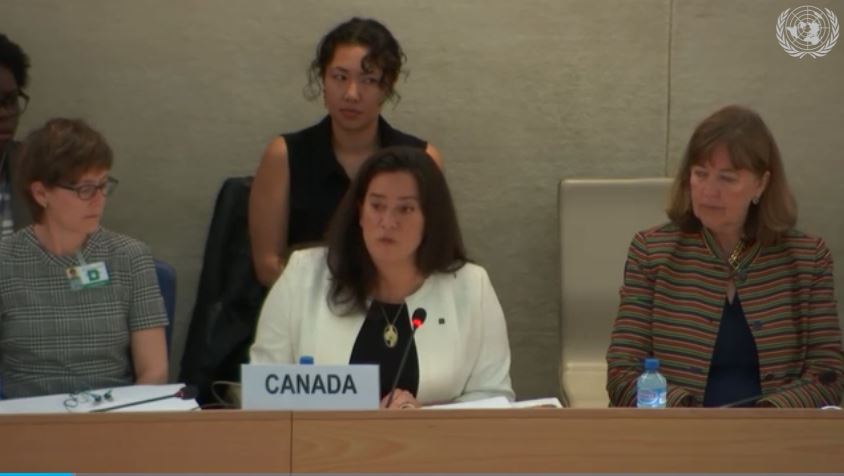Reacting to the adoption today of the draft outcome document of an important UN review of Canada’s human rights record, Amnesty International joined 30 Indigenous peoples’ organizations and civil society groups in calling on the federal government to break from past, disappointing responses to international human rights reviews and instead take bold and decisive action to ensure effective implementation of the important recommendations that have been made. The call came in the form of an Open Letter to the federal Ministers of Justice, Canadian Heritage and Foreign Affairs.
Canada was examined under the UN Human Rights Council’s Universal Periodic Review process on May 11, 2018; Canada’s third such review since the UPR was instituted in 2008, and the first for the Trudeau government. The draft report adopted today provides a compilation of 275 recommendations for human rights reform directed at Canada by 107 governments.
“Although Canada has adhered to many international human rights treaties and engages actively with the various UN and other international reviews that apply to all countries, we have a dismal and disappointing record of failing to comply with and implement the important, often urgent, recommendations that emerge,” said Alex Neve, Secretary General of Amnesty International Canada’s English Branch. “Federal, provincial and territorial ministers responsible for human rights met last year for the first time in almost three decades, largely out of recognition that our approach to international human rights implementation is not working. How those governments respond to this UPR is the opening and will be the test of whether the commitments made last December are going to make a difference.”
Canada now has four months to review the recommendations that have been made, before reporting back to the Human Rights Council in September, with a report indicating which of them will be accepted. Those recommendations will give shape to a human rights agenda for which Canada will be internationally accountable through to the next review in 2022.
“The government’s consideration of these 275 recommendations over the coming four months is a crucial stage in the UPR process. And it is vital that the federal, provincial and territorial governments develop Canada’s response in collaboration with Indigenous peoples organizations and that civil society groups and the wider public have a timely opportunity to engage and provide input,” said Geneviève Paul, Directrice Générale of Amnistie internationale Canada francophone. “Central to a credible approach to implementing human rights is transparency and meaningful dialogue. That is what we expect of governments between now and the report back to the UN in September.”
Amnesty International, alongside many other Indigenous peoples’ organizations and civil society groups, made an official submission to Canada’s UPR. The submission raised concerns and proposed recommendations across a wide array of human rights concerns, notably the rights of Indigenous peoples, gender equality, including gender-based violence, the rights of refugees and migrants, business and human rights, greater regard for economic, social and cultural rights, national security, criminal justice, ratification of a number of human rights treaties and a strengthened approach to human rights implementation. Many of the points highlighted by Amnesty International and other organizations are reflected in the recommendations made by states. Amnesty International will be pressing federal, provincial and territorial governments to accept and commit to implementation of those recommendations.
Amnesty International very much welcomes the fact that the Canadian delegation, led by Minister of Justice Jody Wilson-Raybould, made a number of important voluntary commitments at the outset of the government’s presentation at the UN on May 11th dealing with Canada’s approach to implementing human rights obligations, a range of concerns related to the rights of Indigenous peoples, and the right to adequate housing. The organization will be looking to the government for immediate steps to move forward with concrete action in those areas; and the resources needed to ensure full implementation.
“Many of the issues raised most frequently by governments in this UPR reflect concerns that have been highlighted in Canada’s two previous UPR appearances as well as reviews conducted by UN treaty committees and other international experts and bodies. This cascading series of repeated, unimplemented human rights recommendations over years, and even decades, cannot continue,” said Alex Neve. “During this UPR, Canada expressed a willingness and intention to significantly improve its mechanisms for, and record of complying with, international human rights obligations and recommendations. An immediate starting point would be to address urgent recommendations made by the UN Committee on the Elimination of Racial Discrimination (CERD) last August regarding failure to respect Indigenous rights in the decision to construct the Site C dam and the effects of the Mount Polley mine disaster in British Columbia, as well as the Safe Third Country Agreement regarding refugee protection along the Canada/US border. Canada is required to report back to CERD on those concerns on a priority basis this August. That is the perfect opportunity to make it clear that the encouraging tone set at the UPR is not just rhetoric.”
“Taking the UPR seriously matters for two very important reasons,” said Geneviève Paul. “First and foremost it matters because it is an effective avenue for addressing human rights violations in Canada and instituting the reforms needed to strengthen human rights protection going forward. It also has critical international impact. At a time when far too many governments continue to ignore and undermine international human rights norms, institutions, and processes like the UPR, it is vital that Canada set a different example. Through commitment and adherence Canada will demonstrate respect for the UPR and the international human rights system more broadly, thus helping to strengthen human rights protection globally.“
The adopted draft outcome document, with any editorial amendments from Member State delegations, is set to be finalized and made available by early June, 2018.






















